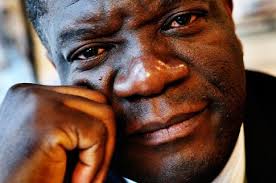Fistula, Panzi Hospital and the Angel of Bukavu
Following from my last post about health inequalities, my Head of School mentioned Panzi Hospital to me as a possible cause for fundraising efforts (we have a few events in our School which raise a modest amount of money for charity each year). I had never heard of the hospital, which got me reading and, horrified, I felt compelled to write this blog. If that sounds a bit dramatic I apologise. I have relied on the words of others mostly, to make sure I do the story justice.
According to the Fistula Foundation (http://www.fistulafoundation.org/) the Democratic Republic of Congo (DRC) is often referred to as “the worst place in the world to be a woman.” They go on to explain that “the reasons for this chilling title are many – although the country is rich in natural resources, decades of instability and violence have left the majority of the population in poverty; the fertility rate is among the highest in the world as are its maternal and infant mortality rates; access to quality healthcare is often limited; and most troubling, the unprecedented and systematic use of rape and sexual violence throughout the country. All of these issues have a particularly devastating impact on women and are correlated to the many cases of fistula found throughout DRC.”
Fistula (information taken from http://www.fistulafoundation.org/)
Fistulas can occur due to childbirth and is especially common in developing countries. An obstetric fistula of the kind that occurs in many developing countries is a hole between a woman’s vagina and one or more of her internal organs. This hole develops over many days of obstructed labour, when the pressure of the baby’s head against the mother’s pelvis cuts off blood supply to delicate tissues in the region. The dead tissue falls away and the woman is left with a hole between her vagina and her bladder and sometimes between her vagina and rectum. This hole results in permanent incontinence of urine and/or faeces. A majority of women who develop fistulas are abandoned by their husbands and ostracized by their communities because of their foul smell.
There is a more sinister cause as well – women are frequently raped as part of conflict – a cowardly weapon used against society. But as with the aftermath of non-fatal military injuries, we rarely consider the reality for the individual when we read stories about mass rape. Traumatic fistula is the result of sexual violence. The injury can occur through rape or women being butchered from the inside with bayonets, wood or even rifles. The aim of sexual violence is to destroy the women and the community within which the sufferer lives. Once committed, the survivor, her husband, children and extended family become traumatized and humiliated. The devastating injuries and social stigma are almost unimaginable. For an individual story, see here http://www.msmagazine.com/spring2005/congo.asp
This is something seen daily at Panzi Hospital in the Democratic Republic of Congo.
Panzi Hospital and the Angel of Bukavu
(From an article by Jessica Keralis, http://www.fmreview.org/DRCongo/keralis.htm)
“Dr Denis Mukwege has been called the ‘angel of Bukavu’. He is a gynaecological surgeon who runs Panzi hospital, a medical centre in South Kivu that specialises in the repair of vaginal fistulas and the treatment of rape victims. Not only is he the only gynaecologist at Panzi but he is the only doctor with gynaecological expertise in all of South Kivu – an area of 65,000 square miles. He is probably the world’s leading expert in repairing injuries resulting from rape.”
Dr Denis Mukwege
“As of October 2008, he had treated over 21,000 rape victims, many of them repeat victims. Most of the patients are cared for under the hospital’s Victims of Sexual Violence programme. Of the 334 beds at the hospital, 200 are allocated to this programme, and it not uncommon to have 450 sexual assault survivors in the hospital at any given time. Women and girls arrive every day for treatment but the hospital can only accept 10-12 new patients each day; the rest are asked to return the following day. One third of the women admitted to Panzi require major surgery. Dr Mukwege treats 3,600 women per year and performs approximately 1,000 reconstructive surgeries per year.”
To support the work carried out at Panzi Hospital, you can donate via the Panzi Foundation, USA: http://www.panzifoundation.org/help.aspx


Really grateful to you, Sue, for bringing both this shocking issue and this charity to my attention.